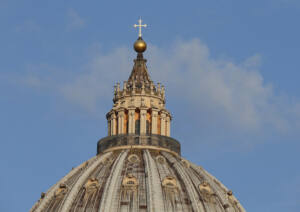
WelCom February 2024
Pope Francis released a new apostolic letter as a motu proprio on 1 November 2023, entitled: Ad Theologiam Promovendam – To Promote Theology. The 1500-word letter, divided into 10 articles, has been described as: ‘presenting an ambitious vision for the renewal of theological pursuit within the life of the Church, cognisant of the shifting cultural landscapes and the Church’s mission in the contemporary world.’ Emeritus Bishop Peter Cullinane of the Palmerston North Diocese comments on Pope Francis’ new letter.
A letter from Pope Francis titled ‘On Promoting Theology’ might seem a bit esoteric – intended for a special group within the Church, not ourselves. After all, its aims are pretty sturdy: In 2014, the International Theological Commission had acknowledged the need for further reflection on teachings that meet resistance by the faithful, ‘in order to communicate more effectively the essential message’; and it admitted that in some cases, resistance ‘may indicate insufficient consultation of the faithful by the magisterium.’ Now, this letter of Pope Francis endorses the need for widespread consultation, ensuring theology is at the service of the Church’s mission, and allowing it to be ‘challenged by reality’.
These aims are rather general. They only become specific in the process of doing the work. So, again, perhaps a task for others, not ourselves. Really? A close look shows Pope Francis is calling for theology to be done through interaction with all the baptised – that’s us – as well as with people of other traditions and other faiths and no faith. Here the Pope is drawing down yet another corollary of the Second Vatican Council’s teachings.
Theology explores what God has said and is saying to the world about how much we matter to God – and therefore to ourselves: ‘Deep amazement at the worth and dignity of the human person is another name for the Christian gospel’ (Pope St John Paul II.) So, doing theology means looking for the signs of God’s presence and God’s love wherever these have been or are being revealed in our lives. Even common sense is described as a ‘theological source in which many images of God live…’. But it is in the body of Christ, the community of Jesus’ disciples, that we can expect God’s word to be more explicit.
Ultimately, Pope Francis wants theology to be a way of living our common calling to discipleship, and emphatically at the service of the Church’s mission in the world.
Bishop Peter Cullinane
There was real drama when the Council rejected a draft description of the Church based on Holy Orders. The Council opted for a draft based on the meaning of Baptism. This was a tectonic paradigm shift. Pope Francis was not the first to draw out the implications of all this. Pope Benedict XVI, for example, taught that the laity are ‘not just collaborators of the clergy’. They are ‘co-responsible with the clergy for what the Church looks like and how it acts’. So, it’s all of us.
In his turn, Pope Francis calls for all of us to listen closely to one another, and with one another to the Holy Spirit. He wants a ‘culture of dialogue’. But he also wants theology to be a way of understanding divine revelation that can be ‘acted upon’, and ‘addressed to the open wounds of humanity and creation…’.
Actually, this deep-seated, long-buried, need was foreshadowed in the Council’s call for smaller dioceses, where people, priests, religious and bishops could work more closely together (Pastoral Office of Bishops, 22-24). It is not exaggerating to say the Diocese of Palmerston North and the re-shaped Archdiocese of Wellington have their origins in the Council’s desire for that closeness which later popes would call co-responsibility and synodality. The Diocese of Palmerston North’s decision to adopt the Acts of the Apostles as its mission statement echoes the co-responsibility and synodality of the first generation of Christians.
Ultimately, Pope Francis wants theology to be a way of living our common calling to discipleship, and emphatically at the service of the Church’s mission in the world. But it is to be ‘worked out on one’s knees, pregnant with adoration and prayer’ and leading to wisdom.